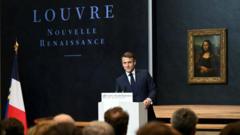The rise of AI in the music industry brings both opportunities and threats to African artists, who must confront the risks of cultural appropriation while exploring new creative avenues. With pioneers like Eclipse Nkasi leading the way, the continent grapples with fostering innovation amidst concerns over ownership and representation.
Embracing AI: A Double-Edged Sword for African Music

Embracing AI: A Double-Edged Sword for African Music
As artificial intelligence reshapes the global music landscape, African artists navigate the balance between innovation and cultural preservation.
The advent of artificial intelligence (AI) in the global music industry poses both exciting opportunities and significant challenges for African artists. With AI technology evolving rapidly, the question remains—how can Africa embrace AI without compromising its rich musical heritage?
One of the most notable advancements comes from Nigerian musician and producer Eclipse Nkasi, who birthed the AI-driven virtual singer Mya Blue. Describing her as a "music lover exploring the different sounds of the world," Mya Blue aims to demystify fears surrounding AI's potential threat to authentic artistry. Nkasi acknowledges the worries voiced by high-profile artists globally about AI's "predatory" use, yet he sees the nascent AI landscape in Africa as an opportunity for innovation rather than a hurdle to overcome.
Nkasi, recognized as a trailblazer in this emerging frontier, has previously produced the region's first AI-powered music album, Infinite Echoes. He emphasizes a creative application of this technology, utilizing it to generate unique samples rather than replace artists. However, apprehensions about cultural appropriation resonate deeply within the continent. Kenyan musician Tabu Osusa raises critical concerns surrounding ownership and acknowledgment of African cultural sounds, fearing exploitation at the hands of wealthy music moguls in the West as they capitalize on AI's efficiency.
Adding to this discourse, a report by Creatives Garage highlights the anxieties prevalent among Kenyan musicians who worry that AI's power might render their creativity less valued. Moving beyond these fears, proponents of AI point out its potential to democratize music creation, offering affordable marketing and tech services to those who can access the tools.
Nevertheless, disparities in access to technology pose a barrier for aspiring artists from less privileged backgrounds. In the context of Western bias influencing AI algorithms, figures like Nkasi note the inherent limitations in accurately reproducing African music styles—pointing towards the continued importance of human musicianship.
Promisingly, entrepreneurs like Emmanuel Ogala, who leads AI-centric project Josplay, contend that AI can help preserve Africa’s diverse music heritage by effectively cataloging and promoting its complexity. Yet, to fully harness AI's potential, advocates argue for substantial financial investment in the necessary data infrastructure.
As African music faces pressures from both global trends and domestic challenges, industry stakeholders agree that a strategic embrace of AI is imperative. Failure to adapt risks losing ownership and narrative control of the continent's rich musical legacy. Ambitious initiatives, exemplified by projects like Mya Blue, underline the vision of a future where technology and tradition can coexist.
In a recent social media interaction, Mya Blue expressed her aspiration to resonate with audiences deeply, hinting at the possibility of virtual representation at awards ceremonies. As the conversation regarding AI and its impact unfolds, the African music industry stands at a crossroads, choosing between preservation and progress.




















